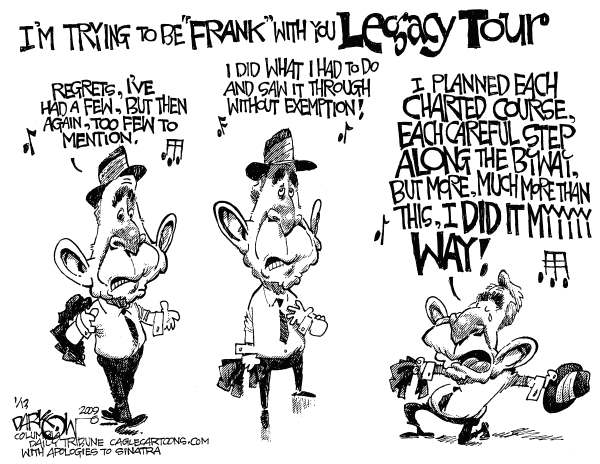
Remember how in the year 2000 and other years Republicans talked about entering the age of “personal responsibility”?
Apparently that message didn’t filter up (or down) to Vice President Dick Cheney who, in an interview with PBS’ Jim Lehrer seems to be doing a Bart Simpson imitation, saying he didn’t do it you can’t prove anything. Here’s Editor & Publisher’s report with some comments from this end:
In an exit interview with PBS’s Jim Lehrer for the “News Hour” airing tonight, Vice President Cheney repeats claims that Saddam Hussein worked with al-Qaeda.
He keeps repeating this even though most experts now acknowledge that there is no evidence that Hussein — a truly murderous rogue who was no angel, although that was never the stated reason for the U.S. invasion — worked with Al-Qaeda. Cheney has now come to resemble a defense attorney repeating a mantra in the hopes that if he says it over and over it will impress the jury that it is so. MESSAGE TO CHENEY: The jury isn’t buying it and, at this point, unless new information emerges, it seems unlikely that history will.
Asked if he made any mistakes in his eight years as V.P., Cheney only mentions underestimating the psychological harm Saddam had done to his own people.
So the claims about weapons of mass destruction weren’t a mistake, not even one that he could argue came from faulty intelligence (an argument actually hard to make, since some reports suggest he ignored intelligence that didn’t say what he wanted it to say).
He said his administration bore no blame for the economic problem: “I think we had good economic policies, especially in the early years.”
But during the early years, many Bush administration defenders were saying that the administration was governing over an economy suffering from “the Clinton recession,” even though the White House had changed hands. So are present problems due to the “Obama recession,” even though he is not in power yet? In fact: most experts will say the Bush administration did indeed play a role in the economic meltdown that has occurred — just as Democrats’ hands are not totally unblemished due to some decisions made by voting members in Congress over the years.
And the terror threat was inherited because of the poor handling by previous presidents.
He’s partially correct in that: MANY administrations dropped the ball on terrorism. But the ball was IN THE COURT of the Bush administration on Sept. 11, 2001 when, reports that came out later noted, it had ignored some early warnings about terrorism in general and bin Laden in particular. Once the U.S. was hit, it realized that it was a subject that needed to be on the front burner. They made decisions on what to do or not do about terrorism before and after 9/11.
On polls showing he is overwhelmingly unpopular among the American people: “I don’t buy that.”
So Gallup, Rasmussen, CNN, Zogby, all the pollsters are wrong or lying? Or is it because they all have lousy methodology and somehow can’t record the fact that (he apparently believes) he actually has a higher favorability rating than Oprah?
And he shrugged off a critical statement today by a key figure, who used to work under him — she called the handling of one terror suspect as clear “torture.”
Torture, schmorture. Who cares what it is, we had the power to do it, felt we had to do it, and we did…so whattyagonna do about it?
Go to the E&P link for the entire transcript.
First bottom line: Cheney’s comments are one reason why Democrats, independent, and thoughtful Republicans should realize the 1960s debate about whether God is dead is now officially over and has been definitively answered: Cheney will leave office next week. Prayers have been answered.
Second bottom line: Cheney thinks “denial” is a river in Egypt.
Cartoon by John Darkow, Columbia Daily Tribune, Missouri
Joe Gandelman is a former fulltime journalist who freelanced in India, Spain, Bangladesh and Cypress writing for publications such as the Christian Science Monitor and Newsweek. He also did radio reports from Madrid for NPR’s All Things Considered. He has worked on two U.S. newspapers and quit the news biz in 1990 to go into entertainment. He also has written for The Week and several online publications, did a column for Cagle Cartoons Syndicate and has appeared on CNN.
















